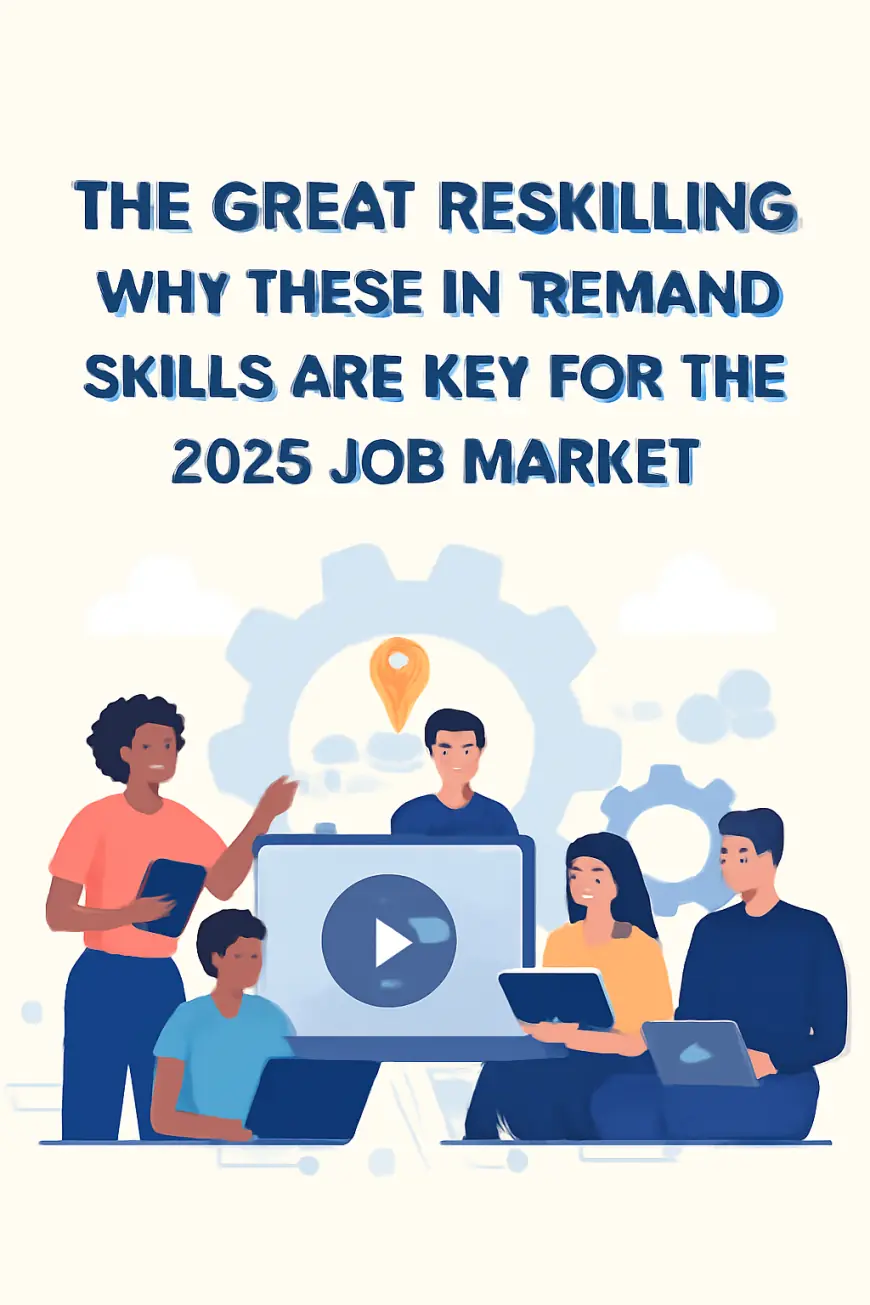The Great Reskilling: Why These In‑Demand Skills Are Key for the 2025 Job Market
The Great Reskilling: Why These In‑Demand Skills Are Key for the 2025 Job Market – Explore digital upskilling strategies and master critical future-ready skills.

Understanding the 2025 Employment Landscape
The job market is evolving faster than ever, with hybrid and remote work becoming standard. Automation and AI are reshaping roles across industries—from finance to healthcare. Understanding learning in-demand skills in 2025 matters starts with recognizing these transformations and the talent demands driving them.
Why Reskilling Matters in Today's Era
Reskilling means learning entirely new skills, while upskilling enhances existing ones. As old roles fade and new ones emerge, closing the skills gap becomes essential for career resilience. The modern job market values adaptability, but nothing is more essential than mastering these in‑demand digital skills.
Top In‑Demand Digital Skills for 2025
-
Data literacy & analytics – Core for decision-making across sectors.
-
Cybersecurity fundamentals – Protecting assets and maintaining trust.
-
Cloud computing & DevOps – Enabling scalable, agile digital platforms.
Emerging Skills Shaping the Future Workforce
-
AI and machine learning basics – Not just for engineers; many roles now need AI fluency.
-
UX/UI design – Crafting user-focused digital experiences.
-
Low-code/no-code development – Empowering non-developers to solve business needs fast.
Specialized Technical Competencies Employers Seek
-
Understanding blockchain fundamentals and crypto principles.
-
Knowledge of IoT systems connecting devices and data.
-
Basics of VR/AR technologies, especially in education, training, and design fields.
Soft Skills That Complement Technical Expertise
While technical knowledge is crucial, so are soft skills such as:
-
Critical thinking and creativity
-
Strong digital communication in remote teams
-
Emotional intelligence and effective collaboration
Flexible Learning Pathways to Reskill
-
Online courses & micro‑credentials (e.g., Coursera, edX)
-
Bootcamps offering rapid, immersive training
-
Community colleges or corporate training programs tailored to local job markets
Selecting the Right Learning Platform
Choose programs with accreditation and proven career outcomes. Look for peer networks, mentorship opportunities, and flexible pacing—balanced with cost and time investment.
Real‑World Success Stories of Career Reskilling
-
A mid-career engineer transitions into data science through bootcamp training.
-
A hospitality professional enters UX design after taking online micro-credentials.
-
A veteran learns cybersecurity and lands a government contractor role.
Measuring ROI on Reskilling Efforts
Track metrics like:
-
Time to secure employment
-
Percentage of salary increase
-
Advancement into senior or hybrid roles
These help justify investment and guide future learning.
Overcoming Common Barriers to Reskilling
Reskilling isn’t easy—but it's achievable. Major obstacles include:
-
Balancing time constraints
-
Finding funding or affordable paths
-
Sorting through the overwhelming number of course options
Role of Employers in Supporting Workforce Learning
More companies now partner with edtech platforms, offer apprenticeships, and foster a lifelong learning culture to keep their teams future-ready.
Forecasting Future Jobs and Skill Requirements
Over the next few years, expect new roles around AI ethics, remote collaboration tools, predictive analytics, and project-based (gig) skill sets. Lifelong adaptability will be the hallmark of success.
Anchor Integration
The modern job market values adaptability, but nothing is more essential than mastering these in‑demand digital skills.
Practical Action Plan to Begin Your Reskilling Journey
-
Conduct a self-assessment of current strengths and gaps.
-
Build a learning roadmap combining micro‑credentials, bootcamps, and real projects.
-
Join professional communities, practice using real tools, and build a portfolio.
Frequently Asked Questions
1. What is reskilling and how does it differ from upskilling?
Reskilling means gaining new, often unrelated skills. Upskilling builds on existing knowledge.
2. Can non-tech people transition into these roles?
Yes—many bootcamps and entry-level programs offer foundational training.
3. How long does it take to become job-ready?
Depending on the path, you may be ready in 3–12 months. Structured bootcamps often compress learning into weeks.
4. Are free courses enough?
Free courses are a great start—but paid programs can offer mentorship, peer support, and career services.
5. How do I showcase new skills on a resume?
Highlight relevant projects, certifications, and any volunteer or freelance experience.
6. What do employers look for in entry-level digital roles?
Curiosity, a growth mindset, hands-on project work, and basic proficiency in tools like Excel, GitHub, or Figma.
Conclusion: Embracing the Reskilling Revolution
As automation and digital transformation redefine work, learning in-demand skills in 2025 becomes not just advantageous—but essential. With intentional learning, industry-aligned programs, and ongoing adaptability, professionals can secure thriving careers in the 2025 job market and beyond.
What's Your Reaction?
 Like
0
Like
0
 Dislike
0
Dislike
0
 Love
0
Love
0
 Funny
0
Funny
0
 Angry
0
Angry
0
 Sad
0
Sad
0
 Wow
0
Wow
0
















































